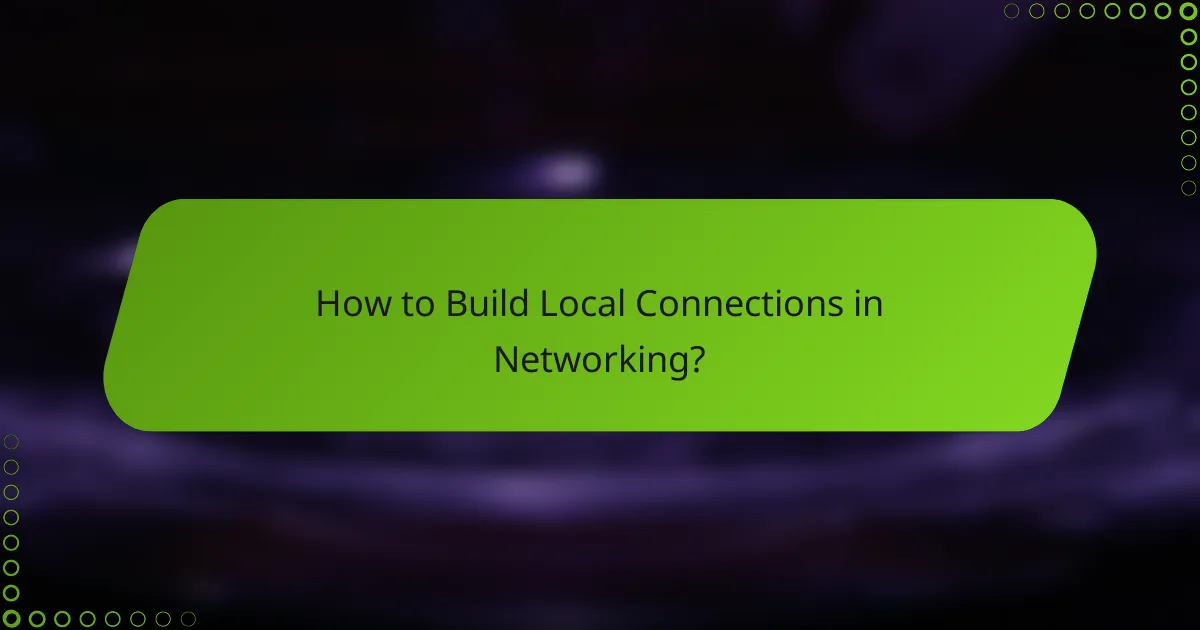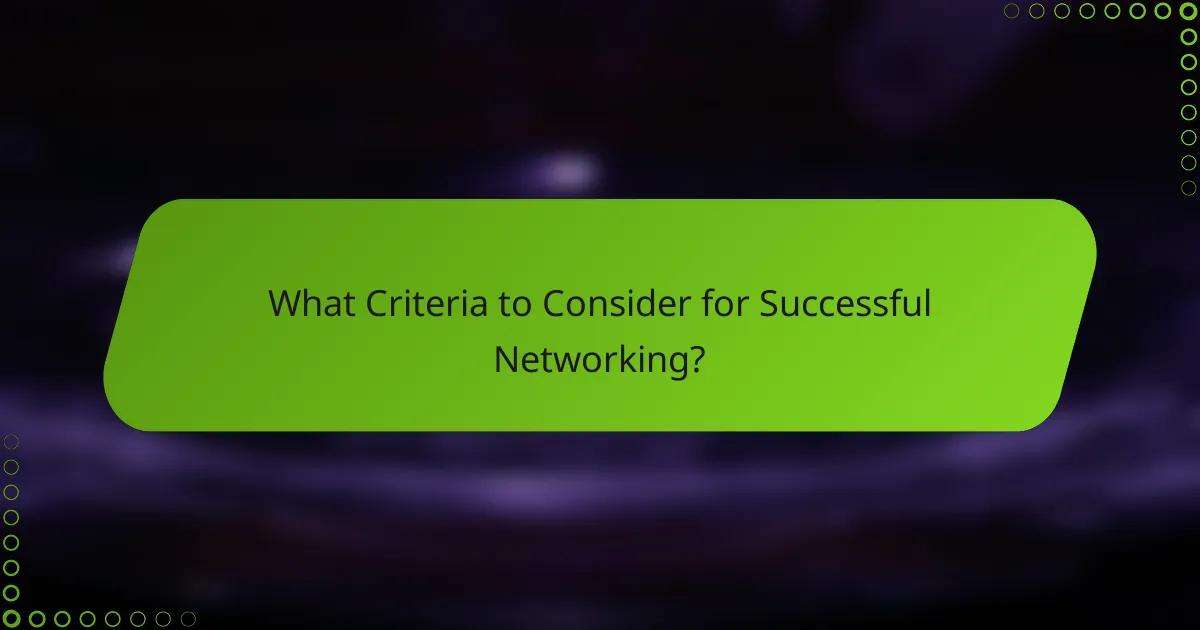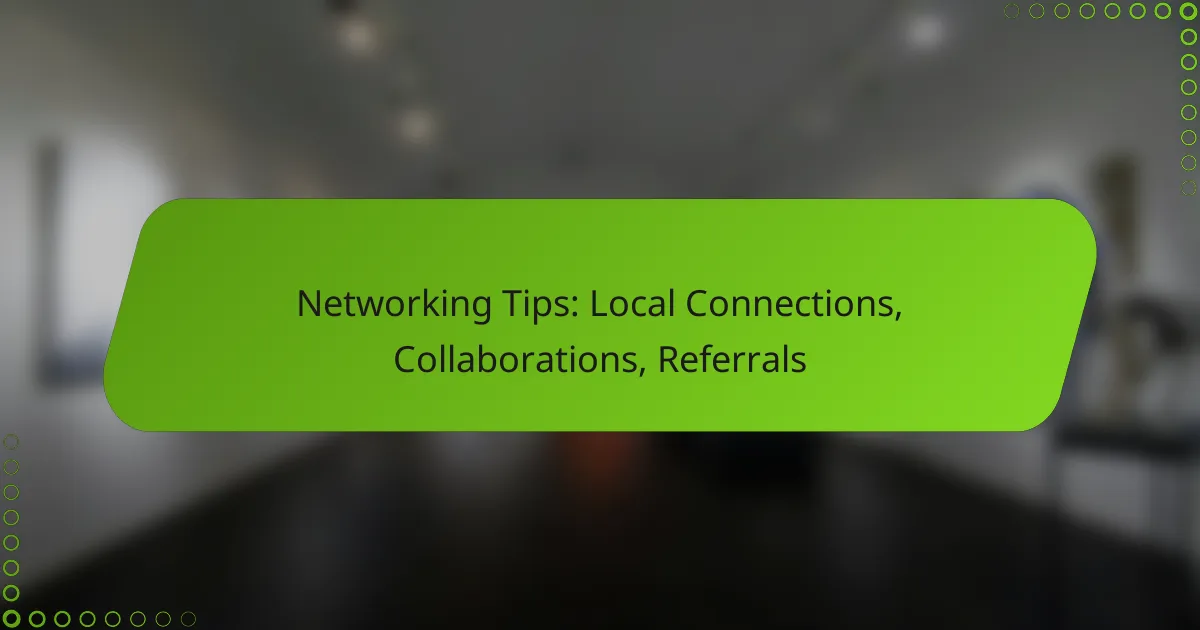Networking effectively within your local community is essential for fostering valuable connections that can lead to fruitful collaborations and referrals. By engaging in local events and building relationships, you not only enhance your visibility but also create a network of support that can drive your success. Leveraging these connections through referrals can significantly boost your business growth, turning satisfied customers into advocates for your services.

You can explore more about effective marketing strategies in cinematic wedding photography marketing.
How to Build Local Connections in Networking?
Building local connections in networking involves actively engaging with your community to foster relationships that can lead to collaborations and referrals. By participating in local events and groups, you can enhance your visibility and create meaningful professional ties.
Attend Local Meetups
Local meetups are informal gatherings where individuals with similar interests come together to share ideas and network. These events can range from industry-specific discussions to general networking opportunities, often hosted in cafes or community centers.
To maximize your experience, prepare a brief introduction about yourself and your goals. Bring business cards to share, and follow up with new contacts after the event to solidify connections.
Join Community Groups
Community groups, such as local chambers of commerce or professional associations, offer structured environments for networking. These organizations often host regular meetings, workshops, and social events that facilitate relationship-building among members.
Consider joining groups that align with your professional interests or target market. Actively participating in discussions and volunteering for committees can enhance your visibility and credibility within the group.
Utilize Local Social Media
Local social media platforms, such as neighborhood-focused Facebook groups or LinkedIn local chapters, provide excellent opportunities for networking. These platforms allow you to connect with local professionals, share resources, and stay informed about community events.
Engage regularly by commenting on posts, sharing relevant content, and initiating discussions. This will help you establish a presence and attract potential collaborators or referrals.
Participate in Networking Events
Networking events, such as conferences, workshops, or trade shows, are designed specifically for professionals to connect. These events often feature speakers, panel discussions, and breakout sessions that can provide valuable insights while facilitating networking opportunities.
When attending, set specific goals for the number of new contacts you wish to make. Follow up with attendees afterward to maintain the momentum of your conversations and explore potential collaborations.
Engage with Local Businesses
Building relationships with local businesses can create mutually beneficial networking opportunities. Consider collaborating on events, offering services, or simply supporting each other’s initiatives to strengthen ties within the community.
Visit local establishments, attend their events, and promote their services on your platforms. This not only helps you connect with business owners but also enhances your reputation as a community supporter.

What Are Effective Collaboration Strategies?
Effective collaboration strategies involve building strong partnerships and leveraging local resources to enhance networking opportunities. By focusing on community engagement and mutual benefits, individuals and businesses can create impactful connections that drive success.
Partner with Local Influencers
Partnering with local influencers can significantly amplify your reach and credibility. These individuals often have established trust within their communities, making them valuable allies for promoting your initiatives.
To start, identify influencers whose values align with your goals. Reach out with a clear proposal that outlines mutual benefits, such as co-hosting events or sharing content. This collaboration can lead to increased visibility and access to new audiences.
Collaborate on Community Projects
Engaging in community projects fosters collaboration while addressing local needs. This approach not only enhances your network but also demonstrates your commitment to the community, which can attract potential clients or partners.
Consider joining forces with local nonprofits or businesses to tackle issues such as environmental sustainability or educational initiatives. These collaborations can take various forms, from volunteer efforts to joint fundraising campaigns, creating a win-win scenario for all parties involved.
Utilize Co-Working Spaces
Co-working spaces are excellent environments for networking and collaboration. These shared workspaces often host diverse professionals, providing ample opportunities for knowledge exchange and partnership development.
When selecting a co-working space, look for one that offers community events or networking sessions. Engaging in these activities can help you connect with like-minded individuals and explore potential collaborations that benefit your business or projects.

How to Leverage Referrals for Business Growth?
Referrals can significantly boost business growth by tapping into your existing customer base to gain new clients. By encouraging satisfied customers to recommend your services, you can create a reliable source of leads that often convert at a higher rate.
Implement a Referral Program
A referral program incentivizes customers to refer new clients by offering rewards such as discounts, cash bonuses, or exclusive services. To set up an effective program, clearly define the rewards and the process for making referrals. Make it easy for customers to participate by providing referral links or templates.
Consider promoting your referral program through email campaigns or social media to maximize visibility. Track the success of your program by monitoring the number of referrals and the conversion rates to ensure it is effective.
Ask for Testimonials
Testimonials serve as powerful endorsements that can influence potential customers. Reach out to satisfied clients and request a brief written or video testimonial highlighting their positive experiences with your business. Make it easy for them by providing guiding questions or a template.
Showcase these testimonials on your website and social media platforms to build credibility. Regularly update your testimonials to keep them fresh and relevant, as recent feedback tends to resonate more with prospective clients.
Network with Complementary Businesses
Building relationships with businesses that offer complementary services can lead to valuable referral opportunities. Identify local businesses that share your target audience but do not compete with you. For example, a wedding planner could partner with a florist to refer clients to each other.
Consider co-hosting events or workshops to showcase both businesses, which can enhance visibility and credibility. Regular communication and mutual support can help maintain these partnerships, leading to a steady stream of referrals over time.

What Tools Can Enhance Networking Efforts?
To enhance networking efforts, utilizing the right tools can significantly improve your connections and collaborations. Tools like LinkedIn, networking apps, and CRM software streamline the process of building and maintaining professional relationships.
Use LinkedIn for Professional Connections
LinkedIn is a powerful platform for establishing and nurturing professional connections. By creating a comprehensive profile and engaging with industry-related content, you can attract potential collaborators and referrals.
Consider joining relevant groups and participating in discussions to expand your network. Sending personalized connection requests can also increase the likelihood of acceptance and foster meaningful relationships.
Utilize Networking Apps like Meetup
Networking apps such as Meetup facilitate in-person and virtual events tailored to specific interests or industries. These platforms allow you to connect with like-minded individuals and attend gatherings that can lead to valuable collaborations.
When using Meetup, look for events that align with your professional goals. Engaging actively during these events can help you make lasting connections and discover new opportunities.
Leverage CRM Software for Follow-ups
Customer Relationship Management (CRM) software can be instrumental in managing your networking efforts. By tracking interactions and setting reminders for follow-ups, you can ensure that no valuable connection is overlooked.
Choose a CRM that suits your needs, whether it’s a simple tool for tracking contacts or a more complex system with automation features. Regularly updating your CRM with notes from conversations can help you personalize future interactions and strengthen relationships.

What Criteria to Consider for Successful Networking?
Successful networking hinges on understanding your objectives and the people you want to connect with. By focusing on specific criteria, you can create meaningful relationships that lead to collaborations and referrals.
Identify Target Audience
Identifying your target audience is crucial for effective networking. Consider who will benefit from your skills and expertise, as well as who can help you achieve your goals. This may include industry peers, potential clients, or mentors who can provide guidance.
To refine your audience, create a profile that includes demographics, interests, and professional backgrounds. For instance, if you’re in tech, you might target software developers, project managers, or tech entrepreneurs. Use social media platforms like LinkedIn to research and connect with these individuals.
Evaluate Networking Goals
Evaluating your networking goals helps you stay focused and measure success. Determine what you want to achieve, whether it’s finding job opportunities, gaining insights into industry trends, or seeking partnerships.
Set specific, measurable, achievable, relevant, and time-bound (SMART) goals. For example, aim to attend three networking events in a quarter or connect with five industry leaders within a month. Regularly review your progress and adjust your strategies as needed to ensure you remain aligned with your objectives.

How to Measure Networking Success?
Networking success can be measured through various indicators such as the number of meaningful connections made, the quality of collaborations initiated, and the referrals received. Tracking these metrics helps assess the effectiveness of your networking efforts and guides future strategies.
Key Metrics to Track
To effectively measure networking success, focus on key metrics like the number of new contacts, follow-up meetings scheduled, and referrals generated. These metrics provide a clear picture of your networking impact and can be tracked over time to identify trends.
Consider using a simple spreadsheet to log contacts, categorize them by industry or relevance, and note any follow-up actions. This organized approach allows for easy analysis of your networking activities.
Qualitative Assessments
In addition to quantitative metrics, qualitative assessments are crucial for understanding networking success. Gather feedback from peers and collaborators about the value of your connections and the effectiveness of your communication.
Conduct informal surveys or one-on-one conversations to gauge how your network perceives your contributions. This insight can help refine your networking strategy and enhance relationship-building efforts.
Setting Goals and Expectations
Establish clear goals for your networking activities to measure success effectively. Goals might include connecting with a specific number of industry professionals or securing a certain number of referrals within a set timeframe.
Ensure your goals are realistic and aligned with your overall professional objectives. Regularly review and adjust these goals based on your networking experiences and outcomes.
Common Pitfalls to Avoid
When measuring networking success, avoid common pitfalls such as focusing solely on quantity over quality. Building a large network is less valuable if the connections are not meaningful or relevant to your goals.
Additionally, neglecting to follow up with new contacts can hinder your networking effectiveness. Make it a habit to reach out after initial meetings to nurture relationships and explore potential collaborations.
